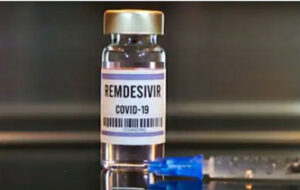Special to CosmicTribune.com, March 15, 2023
Lawsuits have been filed and a criminal investigation is being called based on charges that the FDA approved drug to treat Covid, remdesivir, killed thousands of Americans.
A lawsuit has been filed in U.S. District Court which alleges a spike in deaths from acute renal failure (ARF) in Massachusetts is due to remdesivir, which is produced by Gilead Sciences. The drug’s widespread use was fueled in part by Dr. Anthony Fauci’s endorsement.

Two women have filed lawsuits against Kaiser Permanente and Redlands Community Hospital in California for giving remdesivir to their husbands without consent. Both men died from kidney and organ failure after being administered remdesivir.
“Despite research showing remdesivir is ineffective against COVID-19 and can cause high rates of organ failure, the U.S. Food and Drug Administration authorized the experimental antiviral drug for use against COVID-19 — and it’s still being used,” Dr. Joseph Mercola noted in a March 14 analysis for The Defender.
Remdesivir, brand name Veklury, was approved by the FDA for emergency use against Covid in May 2020. By October 2020, it had received full approval.
Dr. Anthony Fauci has pushed remdesivir as a Covid treatment from the early stages of the pandemic.
Fauci insisted in April 2020 that positive — but unpublished — results from a different placebo-controlled trial sponsored by his institute marked a major turning point in Covid-19 treatment. Fauci said remdesivir, which was originally developed as drug to treat Ebola, would become the standard of care in research studies of Covid treatment.
John Beaudoin, who filed the lawsuit in Massachusetts, is calling for a criminal investigation into the drug, citing data that it may have killed 100,000 people in the U.S.
“They know,” he says, “or they willfully refuse to know. Either way, it’s homicide.”
Via a Freedom of Information Act (FOIA) request, Beaudoin received all the death certificates in Massachusetts from 2015 to 2022.
He found 1,840 excess deaths from acute renal failure from Jan. 1, 2021 to Nov. 30, 2022. Beaudoin also revealed an increase in deaths from acute rental failure in every age group over 15 years old, from 2015 to 2022.
“Remdesivir use didn’t become widespread until 2020,” Mercola noted. “From that time until October 2021, at least 7,491 adverse drug reactions were reported to the World Health Organization’s (WHO) VigiAccess, including 560 deaths, 550 serious cardiac disorders and 475 acute kidney injuries.”
For comparison, Mercola wrote, “only 5,674 adverse drug reactions were reported for ivermectin from 1992 to October 13, 2021. Despite its strong safety profile and efficacy, ivermectin was widely vilified during the pandemic.”
A study published in the Lancet on April 29, 2020 showed no clinical benefit from remdesivir for hospitalized Covid patients.
Remdesivir costs between $2,340 and $3,120, while the average treatment cost for ivermectin is $58.
Mercola asked: “Do you think this has anything to do with remdesivir’s promotion and ivermectin’s vilification?”
Christina Briones, one of the women who filed a lawsuit in California, told CBS News that the day her husband was admitted to the hospital “on Aug. 12, they started the remdesivir and on [Aug, 17] is when they were done. Five doses. [On] the 17th his kidneys started to fail.”
In California, lawsuits have been filed on behalf of at least 14 families against medical providers for prescribing remdesivir without providing necessary information about it, leading to the patients’ deaths.
Another wrongful death suit was filed in Nevada, after a patient died of kidney failure and respiratory failure a week after being given remdesivir.
A study published in Clinical Pharmacology and Therapeutics in April 2021 detected a potential safety signal for remdesivir and acute renal failure:
“The combination of the terms ‘acute renal failure’ and ‘remdesivir’ yielded a statistically significant disproportionality signal with 138 observed cases instead of the nine expected. ROR [reporting odds ratio] of ARF with remdesivir was 20-fold that of comparative drugs.
“Based on ARF cases reported in VigiBase, and despite the caveats inherent to COVID-19 circumstances, we detected a statistically significant pharmacovigilance signal of nephrotoxicity associated with remdesivir, deserving a thorough qualitative assessment of all available data.”
In May 2021, another pharmacovigilance analysis revealed red flags against remdesivir.
“Compared with the use of chloroquine, hydroxychloroquine, dexamethasone, sarilumab, or tocilizumab, the use of remdesivir was associated with an increased reporting of kidney disorders,” the study found.
It concluded:
“Our findings, based on postmarketing real-life data from >5000 COVID-19 patients, support that kidney disorders, almost exclusively AKI [acute kidney injury], represent a serious, early, and potentially fatal adverse drug reaction of remdesivir. These results are consistent with findings from another group. Physicians should be aware of this potential risk and perform close kidney monitoring when prescribing remdesivir.”
In March 2022, yet another pharmacovigilance analysis warned of a significant association between remdesivir and acute kidney injury (AKI), especially in male patients and those over the age of 65 years.
“Although causality was not confirmed,” they noted, “the association between remdesivir and AKI should not be ignored, especially in the older, male COVID-19 inpatients.”
“Using drugs that cause organ failure, like remdesivir, isn’t in the best interest of public health,” Mercola wrote. “The fact that U.S. health authorities have focused on this and similarly harmful drugs to the exclusion of all others, including older drugs with high rates of effectiveness and superior safety profiles, sends a very disturbing message.”

You must be logged in to post a comment Login